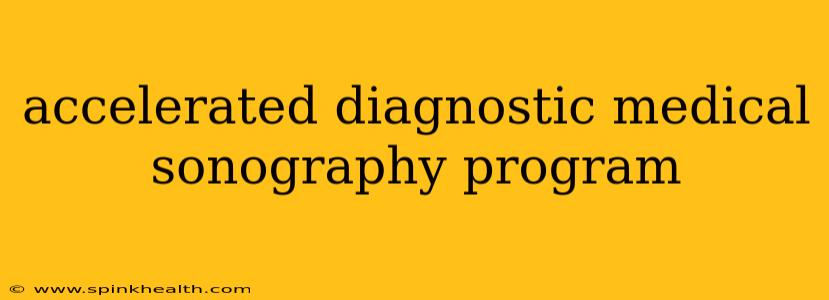The world of healthcare is constantly evolving, and the demand for skilled medical professionals is higher than ever. Diagnostic medical sonographers, those skilled individuals who use sound waves to create images of internal organs and structures, are in particularly high demand. If you're driven, dedicated, and eager to launch a fulfilling career in healthcare quickly, an accelerated diagnostic medical sonography program might be your perfect path. But what exactly are these programs, and are they right for you? Let's dive in.
This isn't just another career; it's a chance to make a real difference in people's lives, playing a crucial role in diagnosis and treatment. Imagine the satisfaction of contributing directly to patient care, using cutting-edge technology to help doctors make life-saving decisions. That's the power of diagnostic medical sonography. And with an accelerated program, you can achieve this rewarding career faster than you might think.
What is an Accelerated Diagnostic Medical Sonography Program?
Unlike traditional programs that span several years, accelerated diagnostic medical sonography programs are designed to condense the curriculum into a shorter timeframe, often 12-18 months. This intensive format requires dedication and self-discipline, but the reward is a significantly faster entry into the workforce. These programs typically pack a robust curriculum into a concentrated period, ensuring you acquire all the necessary skills and knowledge efficiently. Think of it as a sprint instead of a marathon – a fast-paced journey to your professional goals.
How Do Accelerated Programs Compare to Traditional Programs?
The key difference lies in the pace. Traditional programs often spread the same material over a longer period, offering a more relaxed learning environment. Accelerated programs, however, demand a higher level of commitment and time management. While the curriculum is condensed, the quality of education remains comparable to traditional programs. Many accelerated programs boast experienced instructors and state-of-the-art facilities, ensuring you receive top-tier training. The choice depends on your learning style and personal preferences. Are you someone who thrives under pressure and enjoys an intense learning environment, or do you prefer a more gradual approach?
What are the Admission Requirements for Accelerated Diagnostic Medical Sonography Programs?
Admission requirements vary by program, but generally include:
- High school diploma or GED: This is a fundamental prerequisite for most healthcare programs.
- Specific GPA requirements: A strong academic record demonstrates your capability for rigorous study.
- Prerequisites: Some programs mandate completion of specific college-level courses, like anatomy and physiology.
- Background checks: Healthcare roles require thorough background checks to ensure patient safety.
- Entrance exams: Some programs might require standardized tests like the TEAS (Test of Essential Academic Skills).
It's crucial to research specific program requirements as they can significantly differ across institutions.
What is the Curriculum Like in an Accelerated Sonography Program?
Accelerated programs cover the same core competencies as their traditional counterparts, including:
- Anatomy and physiology: A deep understanding of the human body is fundamental.
- Ultrasound physics: Learning how ultrasound technology works is critical.
- Instrumentation and equipment: Familiarity with different ultrasound machines is essential.
- Scanning techniques: Mastering various scanning techniques for different body regions.
- Clinical practice: Hands-on experience through clinical rotations is a vital component.
The intensive nature of accelerated programs means you'll be actively engaged in learning, often involving both classroom instruction and extensive lab work.
What are the Career Opportunities After Graduation from an Accelerated Program?
Graduating from an accelerated diagnostic medical sonography program opens doors to various career opportunities:
- Hospitals: A primary employer for sonographers, offering diverse clinical experiences.
- Clinics: Smaller settings provide opportunities for specialized work, such as obstetrics or vascular sonography.
- Outpatient centers: Convenient locations catering to specific needs, like cardiovascular sonography.
- Physician offices: Opportunities to work directly with physicians, enhancing patient care coordination.
What is the Job Outlook for Diagnostic Medical Sonographers?
The job outlook for diagnostic medical sonographers remains extremely positive. The aging population and advances in medical technology continually increase the demand for skilled professionals in this field. This robust job market makes an accelerated program an even more attractive investment in your future.
Are Accelerated Diagnostic Medical Sonography Programs Worth It?
The decision of whether an accelerated program is "worth it" depends on your individual circumstances, learning style, and career goals. If you're a highly motivated individual who thrives in fast-paced environments and seeks a quick entry into the healthcare field, an accelerated program can be an excellent choice. However, if you prefer a more relaxed learning environment, a traditional program might be better suited. Carefully weigh the pros and cons and research programs thoroughly before making a decision. Consider visiting campuses, speaking to current students and graduates, and evaluating the program's curriculum and reputation before you enroll. Remember, the right path for you is the one that best supports your learning style and personal ambitions.

